The best lenses for Nikon D5200 you can pay at an affordable price.
A lot of photographers, both beginners, and professionals, choose Nikon D5200 as their main instrument for shooting. Its popularity can be easily explained by sophisticated features, comfortable physical controls, high ISO range, and trouble-free continuous shooting.
But the most important feature is the compatibility of this camera with a variety of lenses, fixed and zoom. This allows you to get high-quality shots in most situations.
On the market, you will find a lot of Nikon D5200 compatible lenses, produced by famous brands like Sigma, Tokina, and Tamron. Nikon offers you to choose from more than 70 excellent models.
As you see, choosing the most appropriate option won’t be easy, so we decided to give you a hand. We prepared a short review of the best lenses for Nikon D5200, which includes the examples of prime lenses, telephoto lenses, macro lenses, and wide-angle lenses, compatible with this camera.
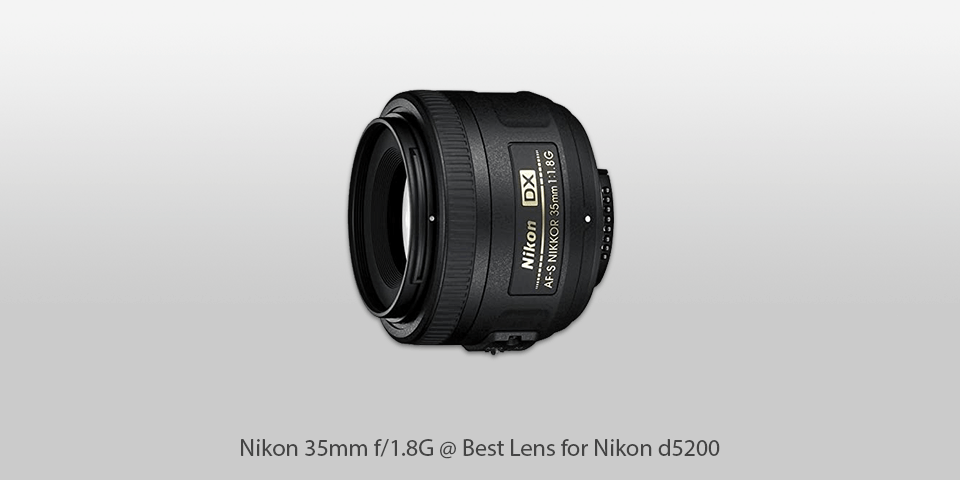
Mount: G | Diaphragm blades: 7 | Autofocus: good | Min focus distance: 0.3 m | Max magnification: 0.16x | Filter thread: 52 mm | Dimensions (WxL): 35 mm | Weight: 7.05 ounces
⊕ Remarkable sharpness
⊕ Lightweight and compact design
⊕ Budget-friendly option
⊖ Slight barrel distortion
The Nikon AF-S DX NIKKOR 35mm f/1.8G is a prime lens for Nikon D5200. This lens is compatible with DX-format cameras, has a small weight and compact design. You will be absolutely impressed with the image quality it delivers.
Shooting in low light, you will appreciate the quick f/1.8 aperture, which creates a nicely blurred background. Thanks to the classic viewing angle, the lens is quite universal.
The AF-S Nikkor 35mm f/1.8G allows you to choose from two focus modes, M/A and M. In the M/A mode you can quickly switch manually during AF operation.
The AF is very quiet, thanks to the SWM ring type. One more great feature of this lens is a rubber seal, which prevents water ingression in the mounting area.
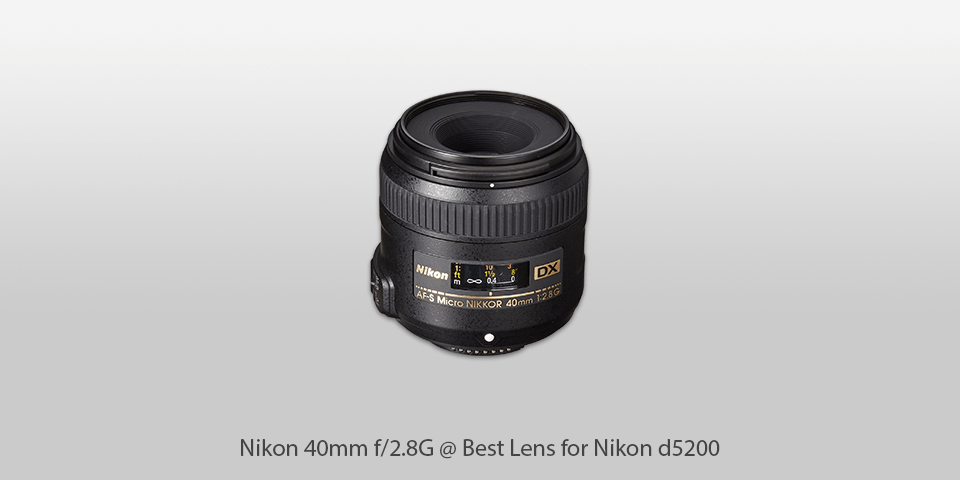
Mount: G | Diaphragm blades: 7 | Autofocus: good | Min focus distance: 0.163 m | Max magnification: 0.11x | Filter thread: 52 mm | Dimensions (WxL): 40 mm | Weight: 0.52 lbs
⊕ Ultra-sharp image
⊕ Focus limiter switch
⊖ Poor optical stabilization
The Nikon AF-S DX Micro-NIKKOR 40mm f/2.8G is a very good camera lens for Nikon D5200. It offers allows for numerous experiments – record HD D-Movies or take perfect stills, shoot general close-ups, take pictures of beautiful flowers, portraits, landscapes, and a lot more. It has a compact and portable design, so you can take it with you wherever you go.
This lens has a standard focal length and is compatible with DX-format cameras, and you will be fully satisfied with its high resolution and contrast.
Other features of the lens are dust and waterproof rubber sealing mount, aspherical lenses for the highest optical performance, quick and silent operation, thanks to inbuilt SWM, fast switch between autofocus and manual operation.
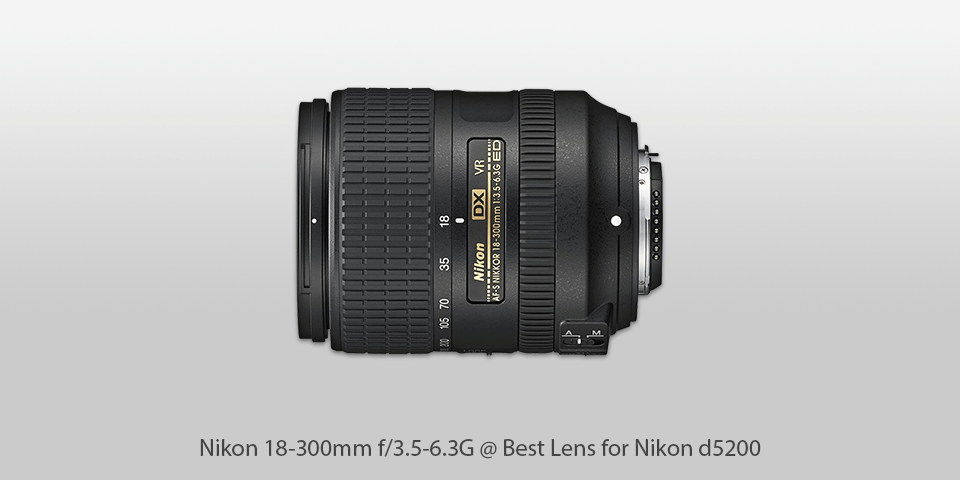
Mount: G | Diaphragm blades: 7 | Autofocus: good | Min focus distance: 0.48 m | Max magnification: 0.32x | Filter thread: 67 mm | Dimensions (WxL): 300 mm | Weight: 1.21 lbs
⊕ Great stabilization
⊕ Lightweight and compact design
⊖ Possible distortion
The Nikon AF-S DX NIKKOR 18-300mm f/3.5-6.3G ED VR is another great camera lens for Nikon D5200, which allows you to make amazing close-up pictures at the concert, and unbelievable wide-angle panoramic shots, easily switching between a wide-view angle and telephoto.
The design of the lens is very convenient. The detail of the pictures and video is perfect, thanks to Vibration Reduction technology. When you record a video, the camera noise is minimized by a quick and silent autofocus system.
The most progressive Nikon’s technologies are embedded in this lens. You can enjoy super quick and quiet autofocus, provided by the Silent Wave Motor, the greatest contrast and minimized flare and ghosting thanks to three Aspherical and Extra-low Dispersion glass elements, and the background blur created by a rounded 7-blade diaphragm.
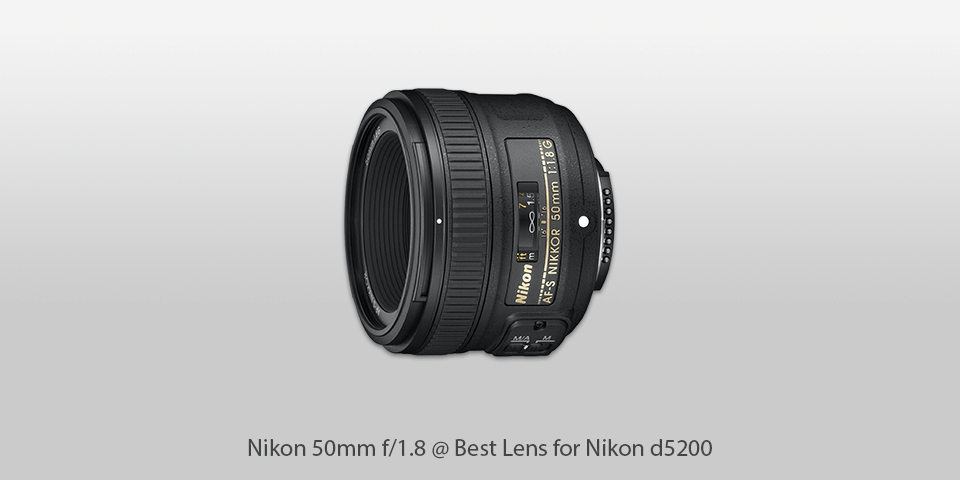
Mount: AF | Diaphragm blades: 7 | Autofocus: good | Min focus distance: 0.45 m | Max magnification: 0.15×| Filter thread: 53 mm | Dimensions (WxL): 50 mm | Weight: 185 g
⊕ Sharp image
⊕ Portable design
⊕ Agile aperture
⊖ Lacks vibration reduction or aperture ring
The Nikon AF-S NIKKOR 50mm f/1.8G is great for casual tasks. Thanks to the focal length of 50mm and a quick f/1.8 aperture, you will be able to take wonderful shots with a shallow depth of field and the subject standing out from the background.
The portable design of the lens allows you to carry it with you without tiring your back. Nikon's Super Integrated Coating ensures better light transmission, delivers crisp colors and reduced glare.
In addition to the above-mentioned features, the lens has an Aspherical Lens Element, which virtually eliminates aberrations.
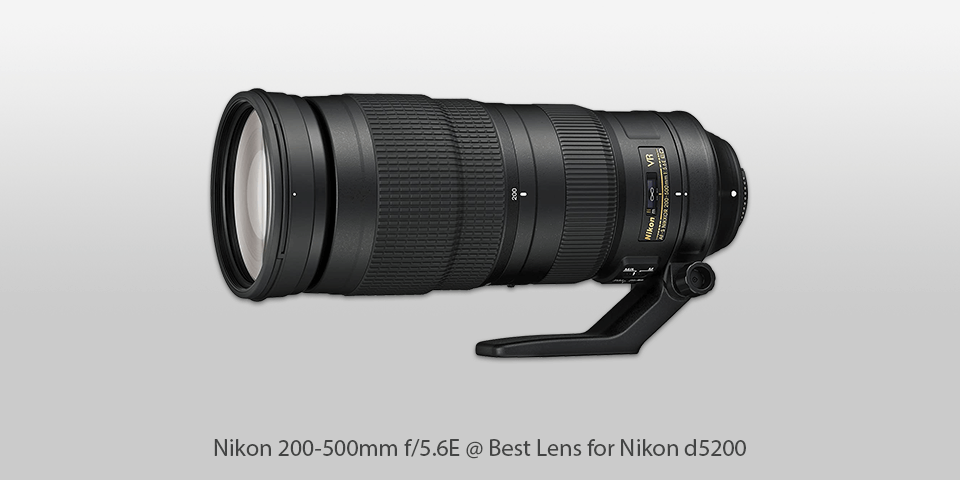
Mount: E | Diaphragm blades: 9 | Autofocus: good | Min focus distance: 2.2 m | Max magnification: 0.22x | Filter thread: 95 mm | Dimensions (WxL): 500 mm | Weight: 5.07 lbs
⊕ Remarkably sharp
⊕ Long telephoto reach
⊕ Optical stabilization system
⊕ Removable tripod collar in the kit
⊖ Some competitors have better zoom
The Nikon AF-S NIKKOR 200-500mm f/5.6E ED VR is an exceptional telephoto lens for Nikon В5200. With this lens, you can photograph tiny birds, beautiful nature, athletes, actors, etc.
Thanks to a quick f/5.6 aperture, your pictures will have a nicely blurred background. A special integrated coating on the lens will minimize the flare and ghosting to enhance clarity and contrast.
The lens is provided with a Wave Motor AF system, which guarantees quick and quiet focusing, good for photography and videography. Other attractive features are the electromagnetic diaphragm and the Vibration Reduction system.
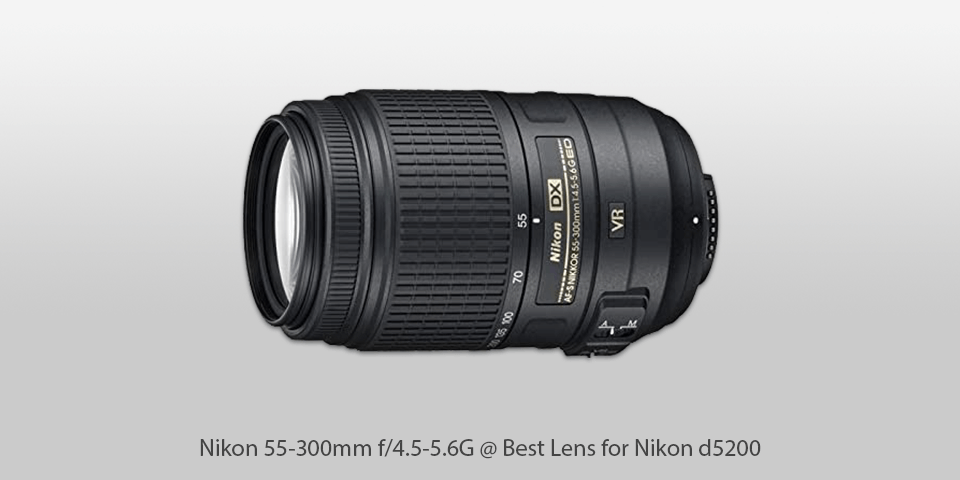
Mount: G | Diaphragm blades: 9| Autofocus: good | Min focus distance: 1.4 m | Max magnification: 0.28x | Filter thread: 58 mm | Dimensions (WxL): 300 mm | Weight: 1.28 lbs
⊕ Good-quality optics
⊕ Decent build quality
⊕ Small weight
⊖ VR system works with delay
This lens for Nikon D5200 lens has a compact 5.5x zoom and is compatible with DX-format DSLR cameras. The lens is universal, so it is often used to take landscape photos, portraits, etc. The AF work is quiet, thanks to the Silent Wave Motor.
The lens is supplied with VR II image stabilization system, Silent Wave Motor, Super Integrated Coating, and Tripod Detection Mode. All these technologies work to provide you with the most precise shots, with minimal ghosting and flare, even in the low light.
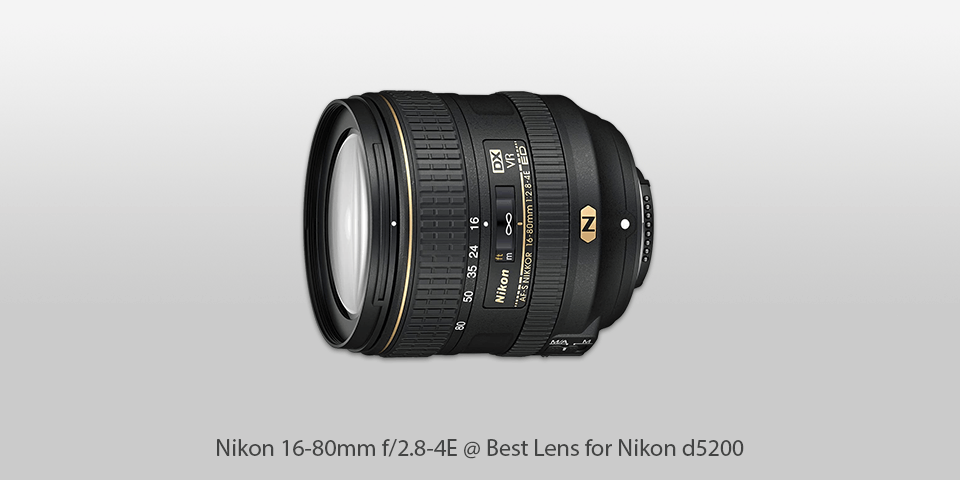
Mount: E | Diaphragm blades: 7 | Autofocus: good | Min focus distance: 0.35 m| Max magnification: 0.22x | Filter thread: 72 mm | Dimensions (WxL): 80 mm | Weight: 1.10 lbs
⊕ Quiet focusing
⊕ Portable
⊕ Flare resistant
⊖ High level of distortion
The Nikon 16-80mm f/2.8-4E is provided with a VR stabilization system and exceptional lens technology. It may be considered one of the best lenses for Nikon D5200, as it delivers perfect image quality regardless of the lighting conditions and the genre you specialize in.
A special Nano Crystal Coat decreases glare, Extra-low Dispersion Glass, and Aspherical elements minimize color aberration and improve sharpness and contrast.
The lens has an electromagnetic diaphragm, which is perfectly synchronized with the shutter to guarantee the best exposure control, especially in high-speed sequences. Also, the front and rear lens elements are covered with a fluorine coating, which protects from water, dirt, and smudges.
| Image | Name | Features | |
|---|---|---|---|
 |
Nikon 35mm f/1.8G
Our choice |
CHECK PRICE→ | |
 |
Nikon 40mm f/2.8G
Compact |
CHECK PRICE → | |
 |
Nikon 18-300mm f/3.5-6.3G
High quality |
CHECK PRICE → |
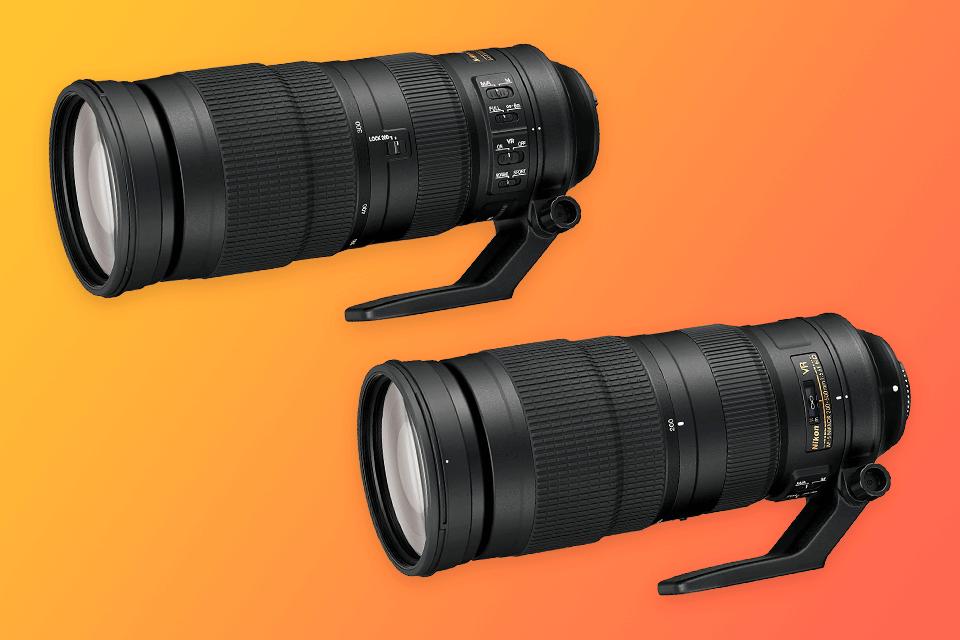
A prime lens has only one focal length, it is also called a fixed lens. A zoom lens offers some variations. Many photographers choose a prime lens for Nikon D5200, as they appreciate a solid quality. Photographers, who opt for a zoom model, like its multi-purpose nature.
In a lens, an adjustable diaphragm is called the aperture. With the help of the aperture adjustments, a photographer decides how much light may go through the lens, and controls the exposure.
The depth of field is also defined by the aperture. With a wide-open aperture, the depth of field will be short, the subject will be sharp, but the distant objects will be blurred. A narrow aperture leads to a long depth of field, which means that the close subject and the distant object will be both sharp enough. The lens with the large aperture is considered “faster”.
There are many Nikon D5200 compatible lenses, though some of them can’t be fully paired with this camera model. For instance, AF-S or AF-I lenses are the best choice to take advantage of AF the camera offers.
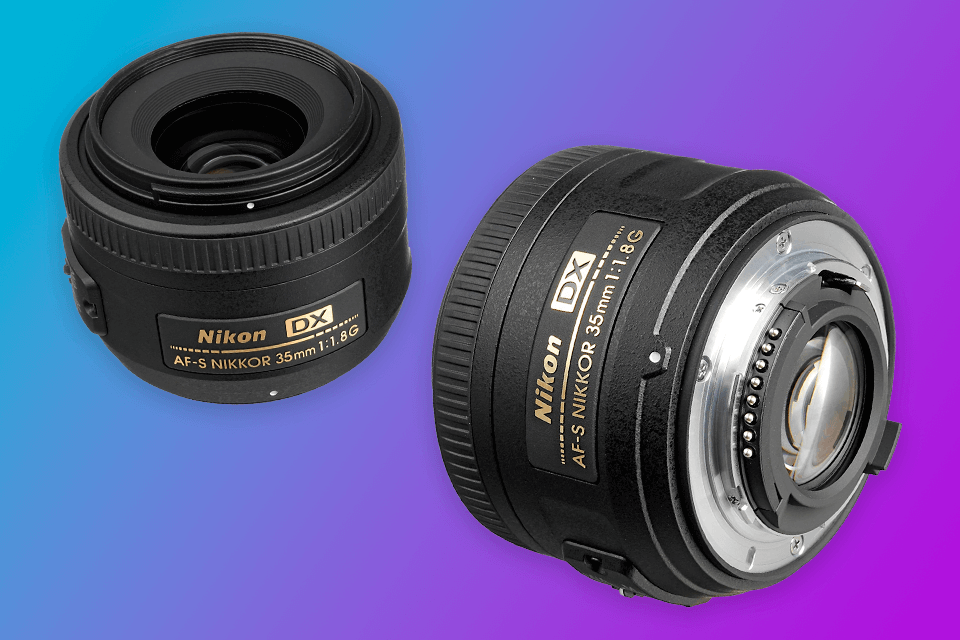
The image quality depends on the focal length, either you choose prime or zoom lens.
Nikon D5200 wide angle lenses are perfect for landscape shooting.
The telephoto lenses make distant objects appear closer to the camera.
Longer focal length causes more “condensed” distances, while wide angles tend to spread distances out.
Short telephotos give an effective focal length of 75 to 120, allowing you to separate the main subject from the background.
We recommend you begin with the 50mm prime.
In our opinion, the list should contain:
The Nikon D5200 50mm lens is the first type to spend money on.
The Ultra Wide-angle comes next.
The mighty macro.
APS-C Nikon shooters may like the AF-S DX NIKKOR 10-24 mm f/3.5-4.5G ED. The Olympus 9-18 mm f/4-5.6 ZUIKO will be great on Micro Four Thirds cameras.
If you are a beginner, and you are choosing your first lens, we recommend you to take the one included in the kit.

 Rating
Rating